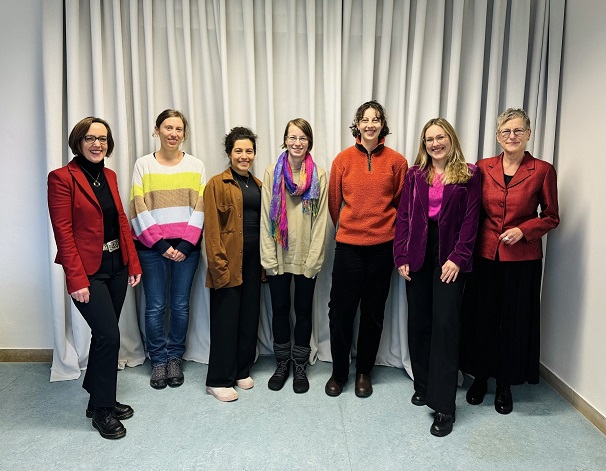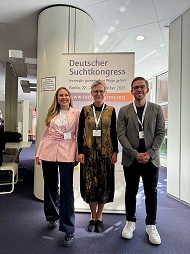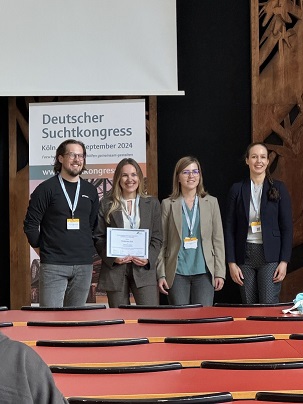
Herzlich Willkommen ...,
auf der Seite der Arbeitsgruppe „Substanzungebundene Abhängigkeitserkrankungen“ der Klinik für Psychosomatik und Psychotherapie.
Unsere Arbeitsgruppe beschäftigt sich mit Verhaltenssüchten mit folgenden Schwerpunkten: zwanghafte Kauf-Shopping-Störung, Computerspielstörung, Soziale-Netzwerke-Nutzungsstörung und Food Addiction. Auf dieser Seite finden Sie Informationen zu laufenden Projekten und Behandlungsangeboten.
Leitung: aplProf`in Dr. Dr. Astrid Müller
Mitarbeiter*innen: M. Sc. Tobias Thomas, M. Sc. Patricia Schaar, M. Sc. Alina Bader, B. Sc. Damla Seck
Weitere Doktorand*innen/Mitarbeiter*innen: M. Sc. Bjarn-Ove Tetzlaff, cand. med. Justus Varvaras,
cand. med. Nicolas K. Erdal, cand. med. Nils M. Stelljes, cand. med. Eltje Ihle, Tanja Bogel
Gastwissenschaftlerinnen: Dr. rer. biol. hum. Nora M. Laskowski, Dr. rer. biol. hum. Ekaterini Georgiadou
Aktuelles in dieser Gruppe:
Forschung hautnah miterleben – Proband:innen gesucht:
Weitere Informationen finden Sie in unserem Flyer.
Weitere Informationen finden Sie in unserem Flyer.
Weitere Informationen finden Sie in unserem Flyer.
Laufende Projekte der Arbeitsgruppe:
Projekte i.R. der transregionalen DFG-Forschungsgruppe FOR2974 "Affective and congnitive mechanisms of specific internet-use disorders (ACSID)"
1. Förderperiode
Funding: German Research Foundation (DFG)
The ability of conditioned stimuli to affect instrumental responding is a robust finding from animal as well as human research and is considered a key factor for the development and maintenance of addictive behaviors. In Internet use disorders, Pavlovian conditioning processes are thought to intensify motivational responses, which can activate instrumental reward seeking. However, there is very limited knowledge on the impact of conditioned cues on instrumental responding and of factors that affect these processes (e.g. acute stress) in individuals with risky or problematic use of specific Internet applications. While there is evidence that acute stress may trigger relapse in addictions, no study to date has investigated the effect of acute stress on the impact of conditioned cues on instrumental responding in individuals at risk for Internet use disorders. The aim of this project is to investigate the impact of conditioned stimuli on instrumental responding and possible effects of acute stress in early stages of buying-shopping disorder and gaming disorder.
Researchers MHH: M. Sc. Tobias Thomas
Link zur DFG-Forschungsgruppe FOR2974: https://www.uni-due.de/for2974/
Funding: German Research Foundation (DFG)
Cue reactivity and craving, attentional bias and implicit cognitions are considered to be underlying mechanisms in the development and maintenance of behavioral addictions. It is assumed that stress may influence affective and cognitive responses in individuals with behavioral addictions, including those with compulsive buying-shopping disorder or social network use disorder. There is a lack of research considering stress and its impact on affective and cognitive mechanisms in both internet-use disorders. Therefore, this research project addresses the predictive role of acute psychosocial stress for cue reactivity, craving, and addiction-related implicit cognitive processes in individuals with pathological use of either shopping websites or social network sites.
Researchers MHH: M. Sc. Maithilee Joshi, M. Sc. Katja Tilk, Cand. med. Nicolas K. Erdal
Link zur DFG-Forschungsgruppe FOR2974: https://www.uni-due.de/for2974/
2. Förderperiode
Funding: German Research Foundation (DFG)
In our previous research, we demonstrated that stimuli conditioned to Internet gaming or buying-shopping applications enhance instrumental responding for rewards related to these applications in participants with risky use of gaming or buying-shopping, a so-called Pavlovian-to-instrumental transfer (PIT) effect. Although we found that devaluation (i.e. telling participants that no more rewards are available) decreased reward-related responding, the stimuli still had the power to bias responding. Research on substance use disorders suggests that different training approaches can lead to a devaluation of substance-related stimuli, which in turn affects, for example, automatic approach tendencies. Regarding clinical outcome parameters (e.g., relapse rates), the evidence for cognitive bias modification (CBM) aimed at decreasing an alcohol-related approach bias is the most convincing. The few studies available for Internet-use disorders provide preliminary evidence for the efficacy of CBM for gaming disorder, but also suggest that systematically associating gaming-related stimuli with negative outcomes (i.e. evaluative conditioning) may be an effective method to reduce the reward value. Against this background, this proof-of-concept study is conducted to compare the effects of a modified CBM (i.e. DEV-CBM) and CBM on affective and cognitive mechanisms. In DEV-CBM, we combine CBM with evaluative conditioning by systematically associating stimuli related to gaming/buying-shopping with stimuli referring to individual negative consequences from using these applications.
Researchers MHH: M. Sc. Patricia Schaar , B. Sc. Damla Seck
Link zur DFG-Forschungsgruppe FOR2974: https://www.uni-due.de/for2974/

Funding: German Research Foundation (DFG)
According to the I-PACE (Interaction of Person-Affect-Cognition-Execution) model, the interaction of affective responses to addiction-related, conditioned stimuli with attentional bias and impaired inhibitory control represents a key mechanism in the development and maintenance of addictive behaviors, including buying-shopping disorder (BSD) and social network use disorder (SNUD). It is further assumed that these affective and cognitive processes are triggered by stress. RP5 addresses the role of stress in BSD and SNUD by applying an experience sampling method (including ecological momentary assessment with saliva sampling to measure stress biomarkers). Attentional processes and inhibitory control are investigated with behavioral tasks (flicker task and stop-signal task) in the laboratory setting. The present project includes women, men, and individuals who define themselves as non-binary in order to explore potential gender/sex differences.
Researcher MHH: M. Sc. Tobias Thomas
Link zur DFG-Forschungsgruppe FOR2974: https://www.uni-due.de/for2974/
...weitere Projekte:
Funding: German Research Foundation (DFG)
Obesity is one of the major health problems in the Western World with a dramatic increase in the last decades. Unfortunately, the long-term efficacy of weight loss interventions is low. One way to enhance the efficacy of treatment interventions may be to provide more tailored interventions for special subgroups of patients with obesity. The development of such interventions requires a better understanding of the psychological mechanisms that contribute to the development and maintenance of obesity. In this regard, two conditions related to obesity are particularly relevant: binge eating disorder (BED) and food addiction (FA). Against this background, the aim of this study is to investigate whether BED and FA are two distinct, yet overlapping, conditions regarding affective and cognitive psychological processes contributing to obesity.
Researchers MHH: M. Sc. Alina Bader, B. Sc. Damla Seck
Patients suffering from addictive disorders tend to notice stimuli associated with their addition faster than individuals without the disorder. The study uses a grid flicker task, which measures both initial orienting and maintained attention during visual search in a grid of addiction-related images. Grid flicker tasks have already been used to investigate attentional biases in individuals with substance use disorders and gambling disorder but have not been applied to buying shopping or social network use disorder. The aim of this pilotstudy is to test the feasibility of the flicker task with addiction-related visual buying shopping and social network stimuli in a convenience sample.
Reseachers MHH: M. Sc. Patricia Schaar, B. Sc. Damla Seck, M. Sc. Tobias Thomas
The pilotstudy is conducted in cooperation with the General Psychology: Cognition and Center for Behavioral Addiction Research (CeBAR), University of Duisburg-Essen (Prof. Dr. Matthias Brand, Dr. Elisa Wegmann) and Psychology: Media and Communication, University of Duisburg-Essen (Prof. Dr. Nicole Krämer)
Criminal behavior is often reported in practice by individuals affected by problematical or pathological buying-shopping. However, hardly any research has been conducted into how common these behaviors are and which personality traits and/or specific buying/shopping behaviors contribute to this deviant behavior. The aim of this study is therefore to gain more insight into the factors influencing criminal behavior within the context of buying/shopping behavior. For this purpose, associations between self-esteem, materialistic value orientation and personality traits with buying/shopping behavior and criminal behavior are analyzed.
Researchers MHH: Dr. Nora M. Laskowski (guest scientist), Dr. Ekaterini Georgiadou (guest scientist), Prof. Dr. Dr. Astrid Müller
A link has been found between behavioral addictions and higher perceived stress. We know from students that they are often confronted with stressors and report high levels of stress. According to the stress mindset theory, beliefs and theories can influence the evaluation of situations and thus have an individual impact on the stress experience. The aim of this study is to examine whether increased stress is associated with Internet-related behavioral addictions in students and whether stress mindset moderates this association.
Researchers MHH: Dr. Ekaterini Georgiadou (guest scientist), Prof. Dr. Dr. Astrid Müller



